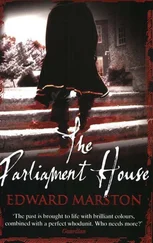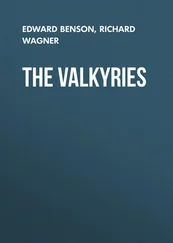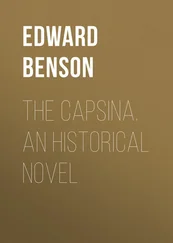Edward Benson - The House of Defence. Volume 1
Здесь есть возможность читать онлайн «Edward Benson - The House of Defence. Volume 1» — ознакомительный отрывок электронной книги совершенно бесплатно, а после прочтения отрывка купить полную версию. В некоторых случаях можно слушать аудио, скачать через торрент в формате fb2 и присутствует краткое содержание. Жанр: foreign_prose, на английском языке. Описание произведения, (предисловие) а так же отзывы посетителей доступны на портале библиотеки ЛибКат.
- Название:The House of Defence. Volume 1
- Автор:
- Жанр:
- Год:неизвестен
- ISBN:нет данных
- Рейтинг книги:3 / 5. Голосов: 1
-
Избранное:Добавить в избранное
- Отзывы:
-
Ваша оценка:
- 60
- 1
- 2
- 3
- 4
- 5
The House of Defence. Volume 1: краткое содержание, описание и аннотация
Предлагаем к чтению аннотацию, описание, краткое содержание или предисловие (зависит от того, что написал сам автор книги «The House of Defence. Volume 1»). Если вы не нашли необходимую информацию о книге — напишите в комментариях, мы постараемся отыскать её.
The House of Defence. Volume 1 — читать онлайн ознакомительный отрывок
Ниже представлен текст книги, разбитый по страницам. Система сохранения места последней прочитанной страницы, позволяет с удобством читать онлайн бесплатно книгу «The House of Defence. Volume 1», без необходимости каждый раз заново искать на чём Вы остановились. Поставьте закладку, и сможете в любой момент перейти на страницу, на которой закончили чтение.
Интервал:
Закладка:
E. F. Benson
The House of Defence v. 1
My Dear Friend,
It is with your permission that I dedicate this book to you, and with your permission and by your desire that I explain the circumstances of its dedication. You were cured, as both you and I know, of a disease that medical science had pronounced incurable by a certain Christian Science healer, who used neither knife nor drugs upon you.
I, a layman in medical affairs, think, as you know, that your disease was nervous in origin, and you will readily admit that the wise and skilful man who figures here as Sir James thought the same. But it was already organic when you went to him, and, after consultation with others, he pronounced it incurable. At the same time, he acknowledged its nervous origin, and you will acknowledge that with the utmost frankness he confessed entire inability to say how a nervous affection entered the more obviously material world of organic trouble. He had instances in plenty: fear, anxiety, he said, affected circulation and digestion, and that, of course, is patent to everybody. So, too, is the cure: remove the anxiety or fear, and you will get gastric affairs to go smoothly again, unless organic trouble has begun.
I suppose it is because we are all so used to that sort of mental healing (do not contradict me yet) that we no longer see any mystery attaching to it. But in such a cure there is no doubt whatever that the mind acts on the body, even as it acted before, when fear produced the imperfect action of the digestion, and heals just as it hurt. To go a step farther, I see no reason why the mind should not heal the disease of drinking or drug-taking, for in these, too, it is the brain that is the seat of the trouble, and its disease and desire is the real cause of the damage done to bodily tissue. But when – still logically, though in a scale that swiftly ascends – you tell me that some power not surgical can heal a compound fracture, then I must part company. At least, I do not believe that any man living upon this earth can make it happen that bones that are broken should join together (especially when the fracture is compound and they stick out of the skin) without assisting Nature by what you call “mere manipulation,” but by what I call, “setting the bone.”
It is here we join issue.
We have often discussed these points before, and the discussion has ever ended in laughter. But the discussion ends this time in the book which I have written.
You have read these pages, and you know that in some points you seem to me to be very like Alice Yardly, but those are the points on which we agree to differ. I think Alice Yardly and you are often too silly for words. But you are much more essentially like Bertie Cochrane, and it is to you, in the character of him, that I dedicate this book. You, sick with a mortal disease, found healing in Christian Science, and in it found happiness. And now you yourself heal by the power that healed you. For I hope I shall never forget that which I with my own eyes saw you do – that which is the foundation of the last scene of the healing in “The House of Defence.” To save that drug-logged wreck, who was our friend, when you saw no other way of convincing him of the beastliness of his habit, you drank that which by all that is known of the drug should have killed you, and you drank it with complete and absolute confidence that it could not possibly hurt you. It is true – at least, Sir James tells me so – that it is not quite easy to poison oneself with laudanum, because the amateur will usually take too much, and be sick, or too little, and thus not imbibe a fatal dose. But you drank a good deal – I can see now the brown stuff falling in your glass – and it appeared to have no effect whatever on you. I will go further: it had no effect whatever on you. But it had the effect you foresaw on your patient: it cured him.
Now, again and again I ask myself, how did it cure him? He was very fond of you; he saw you, in the desire to save him, apparently lay down your life for him. I believe that his brain, his will-power, received then so tremendous and bracing a shock that laudanum for that moment became to him a thing abhorrent and devilish, as no doubt it is. The sight of you swallowing the deadly thing gave a huge stimulus to his will. That seems to me not only possible, but natural. Only, if this is the case, it was again his own mind, on which your action acted, that healed him.
That, however, does not explain why the drug had no effect on you. There again we part company. I believe it to have been your absolute confidence that it could not hurt you that left you unharmed and unaffected. You said, with a faith that to me is transcendent, “This thing shall not hurt me, because it is necessary for me to drink it.” And your body obeyed the orders of your mind, and was not harmed. But you will have none of that explanation. You say it could not harm you, because there is neither healing nor hurt in material things… And here we are again!
Let me cease to argue with you. Let me only say that to me that evening was an epoch. I have seen and heard of cheerful and serene heroism before, but it never before came so close to me as then, when the storm bugled outside, and the fire spluttered, and you drank your deadly glass.
Affectionately yours, E. F. BensoCHAPTER I
THE little travelling-clock that stood on the broad marble chimney-piece, looking strangely minute and insignificant on the slab supported by two huge Caryatides, had some minutes ago rapped out the hour of eight in its jingling voice, but here, in these high latitudes of Caithness, since the time of the year was close on midsummer, the sun still swung some way above the high hills to the north-west. It shone full, with the cool brightness of the light of Northern evenings, into the deep-seated window where Maud Raynham was sitting, waiting, without impatience, for impatience was alien to her serene habit of mind, but with a little touch of anxiety, for her brother’s return. The anxiety, the wish that he would come, could not be absent, since affection and all its kindred cares were the hearth-side inhabitants of her heart. Also, it must be confessed, she was extremely hungry, and wanted dinner quite enormously.
The window in which she sat was one of six, for the room was of great extent, and looked, perhaps, even larger than it really was owing to its half-dismantled condition, while the shining parquetted floor, almost bare of carpets, was like a surface of dim looking-glass, multiplying the area. In one corner was a small table, laid for two, where they would belatedly dine when he came in; near it was a man’s table, littered with correspondence and the apparatus of tobacco, while close by the fireplace was a low easy-chair, with a basket disgorging needlework beside it, which indicated where she herself had been making her nest until she had strolled across to the window, when the clock struck eight, to enjoy the last half-hour of sunlight, and also to catch sight of her brother when his figure should appear coming up the straight riband of the road towards the house, from the village below, where he had been all day. Though the month was mid-June, a gay sparkle of fire, born of the delectable mixture of peat and coal, burned on the hearth between the two marble Caryatides, making an agreeable brightness for the eye, and destined after sunset to make a warmth not less agreeable; for nights even now were not often without the chill that turned to frost before morning, and this evening, in spite of the clear shining of the low sun, there was in the air that crystalline brightness that portended cold when the direct rays were withdrawn. For the house stood high and exposed on these grey and purple-heathered hills of Caithness, without protection from neighbouring tops or screen of wind-swept trees, and the full vigour of the temperatures both of noon and midnight was felt there without abatement.
Читать дальшеИнтервал:
Закладка:
Похожие книги на «The House of Defence. Volume 1»
Представляем Вашему вниманию похожие книги на «The House of Defence. Volume 1» списком для выбора. Мы отобрали схожую по названию и смыслу литературу в надежде предоставить читателям больше вариантов отыскать новые, интересные, ещё непрочитанные произведения.
Обсуждение, отзывы о книге «The House of Defence. Volume 1» и просто собственные мнения читателей. Оставьте ваши комментарии, напишите, что Вы думаете о произведении, его смысле или главных героях. Укажите что конкретно понравилось, а что нет, и почему Вы так считаете.











